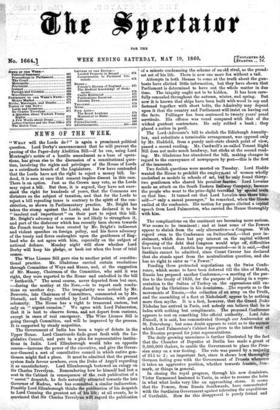NEWS OF THE WEEK.
" WILLI. will the Lords do ?" is again a prominent political question. Lord Derby's announcement that he will prevent the passing of the Paper-duty Abolition Bill—if he can, using Lord Monteagle's notice of a hostile amendment as a base of opera- tions, has given rise to the discussion of a constitutional ques- tion, involving the rights and privileges of the House of Lords as a coordinate branch of the Legislature. Few have contended that the Lords have not the right to reject a money bill. In- deed, it is seen at once that consent implies dissent in this ease. There is an option. Just as the Crown may veto, so the Lords may reject a bill. But then, it is argued, they have not exer- cised the right for hundreds of years that the Commons are dictators on the subject of taxation, and that for the Lords to reject a bill repealing taxes is contrary to the spirit of the con- stitution, as shown in Parliamentary practice. Mr. Bright has taken the stump against the Lords and has declared it to be "insolent and impertinent" on their part to reject this bill. Mr. Bright's advocacy of a cause is not likely to strengthen it, and part of the disfavour which has recently been shown towards the French treaty has been created by Mr. Bright's indiscreet and violent speeches on foreign policy, and his fierce advocacy of the treaty and fierce onslaughts upon the gentlemen of Eng- land who do not agree with him, especially on the subject of national defence. Monday night will show whether Lord Derby will keep his pledge, or back out when the hour of trial
00/11024.
The Wine Licence Bill gave rise to another point of constitu- tional practice. Mr. Gladstone carried certain resolutions through Committee of Ways and Means, and, at the suggestion of Mr. Massey, Chairman of the Committee, who said it was right, they were reported to the House and embodied in the bill " forthwith." The usual course, never departed from but once, —during the mutiny at the Nore,—is to report such resolu- tions on another day. The irregularity was noticed by Mr. Bouverie, late Chairman of Committees, commented on by Mr. Disraeli, and finally rectified by Lord Palmerston, with great solemnity. The House has a right to transcend custom, but only on urgent occasion." We agree with Lord Palmerston, that it is best to observe forms, and not depart from customs, except in cases of real emergency. The Wine Licence Bill is going through Committee, and will be improved by the process. It is supported by steady majorities.
The Government of India has been a topic of debate in the Upper House. Lord Clanricarde finds great fault with the Le- gislative Council, and puts in a plea for representative institu- tions in India. Lord Ellenborough would take an opposite course—increase the power of the executive, and give the Gover- nor-General a sort of consultative council in which native gen- tlemen might find a place. It must be admitted that the present system finds favour nowhere, even the Duke of Argyll regarding it as unsatisfactory. Lord Ellenborough bestowed an eulogy on Sir Charles Trevelyan. Remembering how he himself had lost a seat in the Cabinet in consequence of the rash publication of a " secret " despatch, he feels naturally attracted towards the late Governor of Madras, who has committed a similar indiscretion. Possibly Lord Ellenborough thinks the publication of his despatch to Lord Canning the greatest act of his life; at all events, he is convinced that Sir Charles Trevelyan will regard the publication of a minute condemning the scheme of an old rival, as the proud- est act of his life. There is now one more fox without a tail.
Attempts in both Houses to come at the truth about the gun- boats have elicited little information, but they have shown that Parliament is determined to have out the whole matter in due time. The iniquity ought not to be hidden. It has been care- fully concealed throughout the autumn, winter, and spring. But now it is known that ships have been built with wood in sap and fastened together with short bolts, the Admiralty may depend upon it that the country and Parliament will insist on having out the facts. Pullinger has been sentenced to twenty years' penal servitude. His offence was venal compared with that of the wicked gunboat contractors. He only robbed a bank ; they placed a nation in peril.
The Lord-Advocate's bill to abolish the Edinburgh Annuity-. tax, and substitute a terminable arrangement, was opposed only by Mr. Hadfield, from a purely anti-state church point of view, passed a second reading. Mr. Cardwell's so-called Tenant Right Bill does not make much headway, but sticks at the second read- ing. Mr. Gladstone has abandoned the bill, making changes in regard to the conveyance of newspapers by post—this is the first of the innocents.
Two foolish questions were mooted on Tuesday. Lord Haddo wanted the House to prohibit the emplopuent of women wholly unclothed as models in schools of art, but he only found thirty- two gentlemen who shared his peculiaa fancies. Lord Lovaine made an attack on the South Eastern Railway Company, bemuse the people who went to the prize-fight travelled by .special trala on that line. It turned out that Lord Lovaine Avas there bitii- self—" only a casual passenger," he remarked, when the Mamie smiled at the confession. His motion for papers elicited a capitld speech from Lord Palmerston, who carried the House thoroughly with him.


























